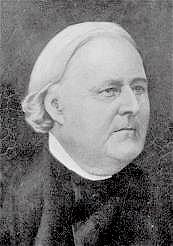1799 - 1862 Person Name: Christian G. Barth Hymnal Number: d134 Author of "The tree of life" in The Anniversary and Sunday School Music Book No. 1-5 Barth, Christian Gottlob, son of C. F. Barth, house painter in Stuttgart, was born at Stuttgart, July 31,1799. He studied at Tubingen, where he was the principal founder of the Missionary Society, and was only restrained by his mother's entreaties from offering himself as a missionary. He became, in 1821, assistant at Neckarweihingen and Dornham, and, in 1822, curate in charge of Effringen and Schönbrunn, near Nagold. In 1824 he was appointed pastor of Möttlingen, near Calw, but resigned his charge in 1838, and settled in Calw, receiving in the same year the degree of D.D. from the University.of Greifswald. He died at Calw of apoplexy, Nov. 12, 1862. At Calw he devoted himself as a writer and preacher to children, as a preacher and writer in the cause of missions to the heathen and to the Jews, and as the founder and director of the Tract Society of Calw. One of his books, the Bible History, reached its 160th edition in 1872, and had then been translated into 24 European, 18 Asiatic, 7 African, and 3 South Sea languages. He frequently attended the meetings of the Religious Tract Society of London, and was a member of the Evangelical Alliance (Koch, vii. 199-210; Allgemeine Deutsche Biographie, ii. 94-95). Of his hymns there have been translated into English:—
i. Auf einem Berg ein Baumlein stand. [Holy Scripture]. Included in his Lieder und Gedichte fur Christenkinder, Calw, 1842, p. 83, in 4 stanzas. Previously in J. Köbner's Christl. Harfentöne, Hamburg, 1840, p. 115. The translations are:—
(1) "Upon a hill there stands a tree," by Dr. H. Mills, 1845 (1856, p. 25), and thence in P. Stow's Ocean Melodies, Boston, U.S., 1849. (2) "A tree grows on a mountain," by Mrs. Bevan, 1859, p. 138. (3) "A tree stood on a mountain," in Dr. H. W. Dulcken's Golden Harp, 1864, p. 22. (4) " On a hill stands a beautiful tree," in W. B. Bradbury's Fresh Laurels, N. Y., 1867, p. 15, signed "L. W." (5) " Lo, on a mount a tree doth stand," by Mrs. H. K. Spaeth, as No. 60 in the Pennsylvania Lutheran Little Children's Book, Philadelphia, 1885.
ii. Erhebe dich, du Volk des Herrn. [Missions.] Written for the Basel Mission Festival, June 12, 1833, In his Christliche Gedichte, Stuttgart, 1836, p. 18, in 8 stanzas. Translated as “Ye people of the Lord, arise!" by Dr. H. Mills, 1856, p. 202.
iii. Hütter, ist die Nacht verschwtinden. [Missions.] Written for the 20th anniversary, June 27,1835, of the Basel Missionary Society, and first published in the Mission Magazine for that year. In his Christliche Gedichte, Stuttgart, 1836, p. 54, in 8 stanzas. The translations are:—
(1) "Ho! watchman, is the night away," by Dr. G. Walker, 1860, p. 84. (2) "Watchman! Hath the night departed," in L. Rehfuess's Church at Sea, 1868, p. 107. [Rev. James Mearns, M.A.]
-- John Julian, Dictionary of Hymnology (1907)
Christian Gottlob Barth


 My Starred Hymns
My Starred Hymns




